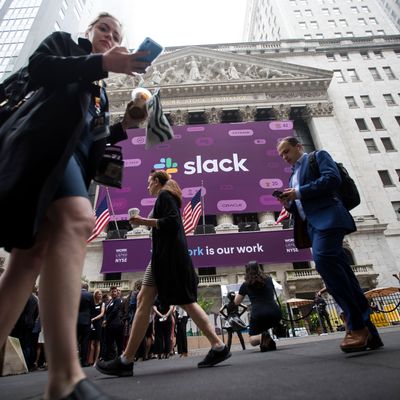
Slack, the workplace-chat app that haunts your life if you work in certain deskbound industries and is likely unknown to you if you don’t, went public on the New York Stock Exchange early Thursday afternoon. The stock — given the ticker symbol WORK, har har — opened trading at $38.50 a share before climbing as high as $42. This would give the company a valuation in the $21 billion range — higher than that of Lyft (to name another 2019 tech-industry public offering), and triple what investors valued Slack at as recently as last August.
All in all, a very exciting day for a very boring company. By “boring” I don’t mean that the Slack app itself is boring (nothing that contains as much gossip, shit talk, and potential for embarrassment as the Slack app does could be boring), but that the way Slack works as a company is a boring: It sells a valuable service directly to other companies, for money.
It’s not that such a business model is rare in Silicon Valley, exactly. But among the last generation or two of tech unicorns (start-ups valued at more than $1 billion), there’s been an implicit expectation that simply selling a product in such a way that you make money isn’t quite enough: You need to be a world-shaping platform behemoth. (“Platform,” in the business sense, meaning a marketplace that connects parties for transactions.) Investors would rather businesses be “platforms” than vendors or manufacturers because platforms are potentially much more lucrative — owning the whole strip mall is better than just being one of the strip mall tenants, especially if you get a cut of all the transactions in the mall. And, in turn, founders and executives would rather run platforms, at least in part because they know that investors will be more generous, and more patient, if there’s even a small chance your start-up is the new Facebook, Google, or Amazon.
This is why Uber, the most prominent of the many Silicon Valley companies to go public in 2019, isn’t a mere taxi-dispatch company that loses hundreds of millions of dollars every year; it’s a transportation and logistics platform that loses hundreds of millions of dollars every year, or why Sweetgreen, taking a page from the tech industry, has started describing itself as a “food platform” instead of as a salad takeout chain. If you want to justify an immense valuation, or lead potential investors to believe that you will someday have an immense valuation, it’s helpful to claim you’re a “platform,” with all the potential lucre such a status entails.
Slack, by contrast, does not talk much about itself as a platform. (The word “platform” appears only 39 times in its prospectus, compared to a whopping 738 in Uber’s S-1.) It’s not that it’s definitively not a platform — it has an app “store,” though most of the apps are free, and Slack doesn’t appear to take a cut from those that charge money — it’s just that it makes its money as a vendor, and seems satisfied with the boring business model of “charging money for a product.” That Slack has an easily understandable business model doesn’t, to be clear, make it a profitable company. It has strong growth numbers, but it lost $140 million last year; its CFO has suggested that it will be years before it achieves profitability. But given its $21 billion valuation, that doesn’t seem to bother investors — perhaps because it’s easy to look at Slack and sense what its profitable form looks like.
Contrast that with a company like Uber, which needs to conquer the world and then win the race to develop self-driving cars before it makes sense as a profit-generating company. Clearly some investors think that’s possible, and, certainly, stranger things have happened — already once this century a Harvard hot-or-not app became a globally powerful quasi-state. But between Slack and Uber, I know which one I’d bet on still being here in ten years.
Slack, if it wanted to, could loudly flog itself as a platform business, like other tech giants. The platform-centric version of Slack would offer full version of basic chat software for free, and take a cut from the developers selling apps built on top of it. It would call itself a workplace communications and logistics platform, and it would burn through even more cash supporting its free users as it attempted to build huge marketplace for itself. It also would have debuted on the stock market with a classic, big-deal IPO, issuing new shares and raising new capital the way Uber and Lyft both have — and, like both Uber and Lyft, it would have suffered from an opening-day pop and disappointing initial performance. Instead, Slack went public with a direct offering, where it simply listed its stock on the NYSE and began trading it. How characteristically boring! And smart.





























